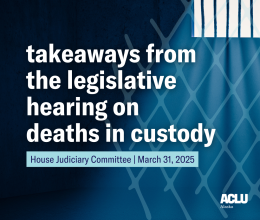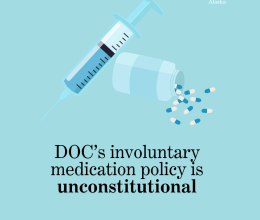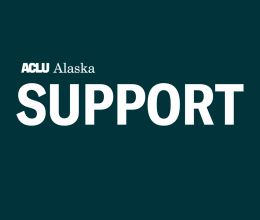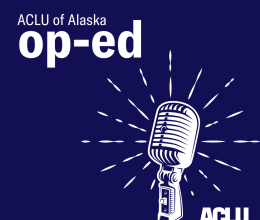
Roughly 4,600 people are detained in state-run prisons and jails. This number includes both sentenced individuals and those awaiting trial or sentencing. Half of the population is pretrial status and 42 percent of the incarcerated population is Alaska Native.
Regardless of race or criminal status, sexual violence inside the walls of prisons and jails is prevalent and frequently reported to the ACLU of Alaska.
The Alaska Prison Project centers restorative justice, healing, community safety, diversion, and alternatives to incarceration to transform Alaska’s failing criminal legal system. Addressing sexual violence in Alaska’s carceral system is critical to achieving this mission. Addressing sexual violence in Department of Corrections (DOC) institutions would assist in the larger effort to reduce high rates of sexual violence across Alaska and end cycles of harm within families.
The legal tool we have to combat sexual violence in our prisons is the Prison Rape Elimination Act (PREA). President George W. Bush signed PREA into federal law on September 4, 2003, with the goal to eradicate rape in jails and prisons across the country. The final standards of PREA adopted a “zero tolerance” policy for acts of sexual violence.
“The success of the PREA standards in combating sexual abuse in confinement facilities will depend on effective agency and facility leadership, and the development of an agency culture that prioritizes efforts to combat sexual abuse. Effective leadership and culture cannot, of course, be directly mandated by rule. Yet implementation of the standards will help foster a change in culture by institutionalizing policies and practices that bring these concerns to the fore.” (PREA preamble, 77 Fed. Reg. 37106)
Failing to address sexual violence in places of detention is not only a PREA and safety issue, but also constitutes cruel and unusual punishment under the Eighth Amendment and violates equal protection under the 14th Amendment of the U.S. Constitution.
As part of the effort to reduce sexual assault in prison and jail facilities, the federal government provides funding to states, including Alaska, to implement measures to eliminate sexual violence, regardless of local fiscal strains. If an agency fails to follow the federal standards of PREA, it is in jeopardy of losing federal funding.
The reality is that Alaska is losing this funding. Since Fiscal Year 2021, Alaska Governor Michael Dunleavy has refused to either certify PREA compliance or provide an assurance that it would spend a certain number of dollars to bring the department into compliance. Despite Alaska's position as the national leader in sexual assault rates per capita, we are one of only five states or U.S. territories that have refused to provide assurances or certification. The DOC in Alaska is currently not meeting the standards required by PREA to keep people in its custody safe from sexual violence.
DOC is responsible for being PREA compliant in 13 state pretrial and sentenced facilities, as well as in agencies it contracts with, which includes 15 jails across Alaska and seven halfway houses.
Despite the state’s lack of PREA compliance or assurance, DOC continues to publish annual public reports, though no state facilities have been audited since 2019.
In the 2023 report published by DOC, the agency said:
178 PREA reports were processed in state-run facilities, but only eight were substantiated, and 35 remained open. Others were considered “unsubstantiated.” 20 PREA-related cases were opened in contracted facilities, with four found to be substantiated and eight remaining open.
Their annual reports reflect relatively low reported incidents and a high proportion of unsubstantiated incidents. According to national experts, this frequently indicates poor reporting mechanisms and a poor investigative process.
The ACLU of Alaska receives, on average, 10 reports of sexual assault every month – all from state-run prisons and jails. Reports of sexual violence are challenging to verify often because of lack of accessible records, a complicated multi-agency response, and the fear of retaliation by incarcerated victims.
Here are some of the patterns of sexual violence we have observed within DOC facilities and places where it must improve to be PREA compliant.
- Of the individuals reporting to the ACLU of Alaska, many report that they submitted PREA complaints verbally to DOC staff and were not followed up with, or told there was no record of their complaint.
- The majority of PREA complaints that the ACLU of Alaska receives are from incarcerated people at Hiland Mountain Correctional Center, Alaska’s only women’s prison, Anchorage Correctional Complex, and Goose Creek Correctional Center.
- Many of the individuals reporting sexual violence to the ACLU of Alaska report that they experienced sexual violence more than once while incarcerated and/or before becoming incarcerated.
- Those reporting sexual abuse while incarcerated are often placed in protective custody, which is solitary confinement. Some are housed in solitary for days; others report spending months there.
- If PREA reports make it to the investigative agency (Alaska State Troopers), incarcerated victims are unable to contact investigators and rarely hear case updates.
- Many reporting to the ACLU of Alaska report they have been sexually assaulted more than once while incarcerated and/or in the community.
In the 2023 report, DOC identified areas in which they could take corrective action to uphold federal PREA standards.
The list included:
- Camera upgrades and blind spot mitigation in state-run facilities.
- Increased funding for travel for compliance requirements, inmate education and programming,
- Staff training and policy development in contracted local jails in Barrow, Cordova, Craig, Dillingham, Haines, Homer, King Salmon, Kodiak, Kotzebue, Petersburg, Seward, Sitka, Unalaska, Valdez, and Wrangle.
- Working with halfway houses to perform audits, and to train investigators.
DOC also listed progress with PREA. According to the report, the department has developed monthly training topics for PREA compliance managers, contractor and vendor training, contract jail staff training, and standardized inmate education.
The Department ends the latest report claiming it is “committed” to addressing the requirements to become fully PREA compliant as it would “increase our physical safety within our facilities for inmates and for staff.” But it’s hard to have faith in that statement, considering the years-long refusal to provide assurances to the DOJ and its limited recommendations to improve safety.
To reduce sexual violence and improve safety, the State of Alaska should:
- Provide assurances to the Department of Justice that it will work to be more PREA compliant;
- Audit all state-run jails and prisons, as well as contracted halfway houses and jails;
- Provide therapeutic treatment opportunities to sexual violence victims and those perpetuating sexual violence;
- Work with community providers to provide generational trauma and healing opportunities;
- Improve communication between DOC and Alaska State Troopers, who most often investigate these reports;
- Create clear and accessible processes for those reporting sexual violence to get updates on their reports.
Eliminating sexual violence in jails and prisons, the original intent of PREA, requires more than responding to it after it happens. Such change will also require providing healing opportunities to those who experience and perpetrate harm, taking additional measures can end cycles of harm in families, and in communities, and in turn improve public safety across the state.
The ACLU of Alaska is committed to ensuring that DOC is meeting PREA standards and keeping all Alaskans in its custody free from sexual violence.



